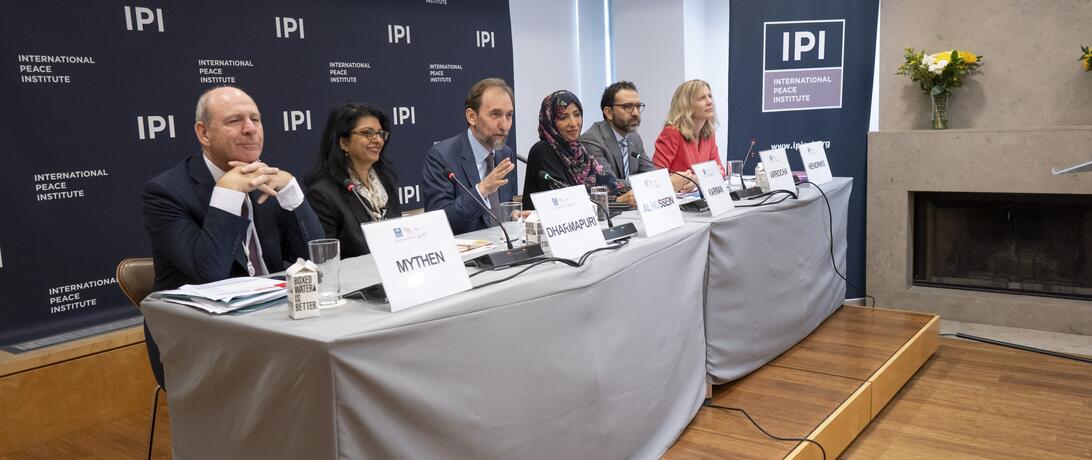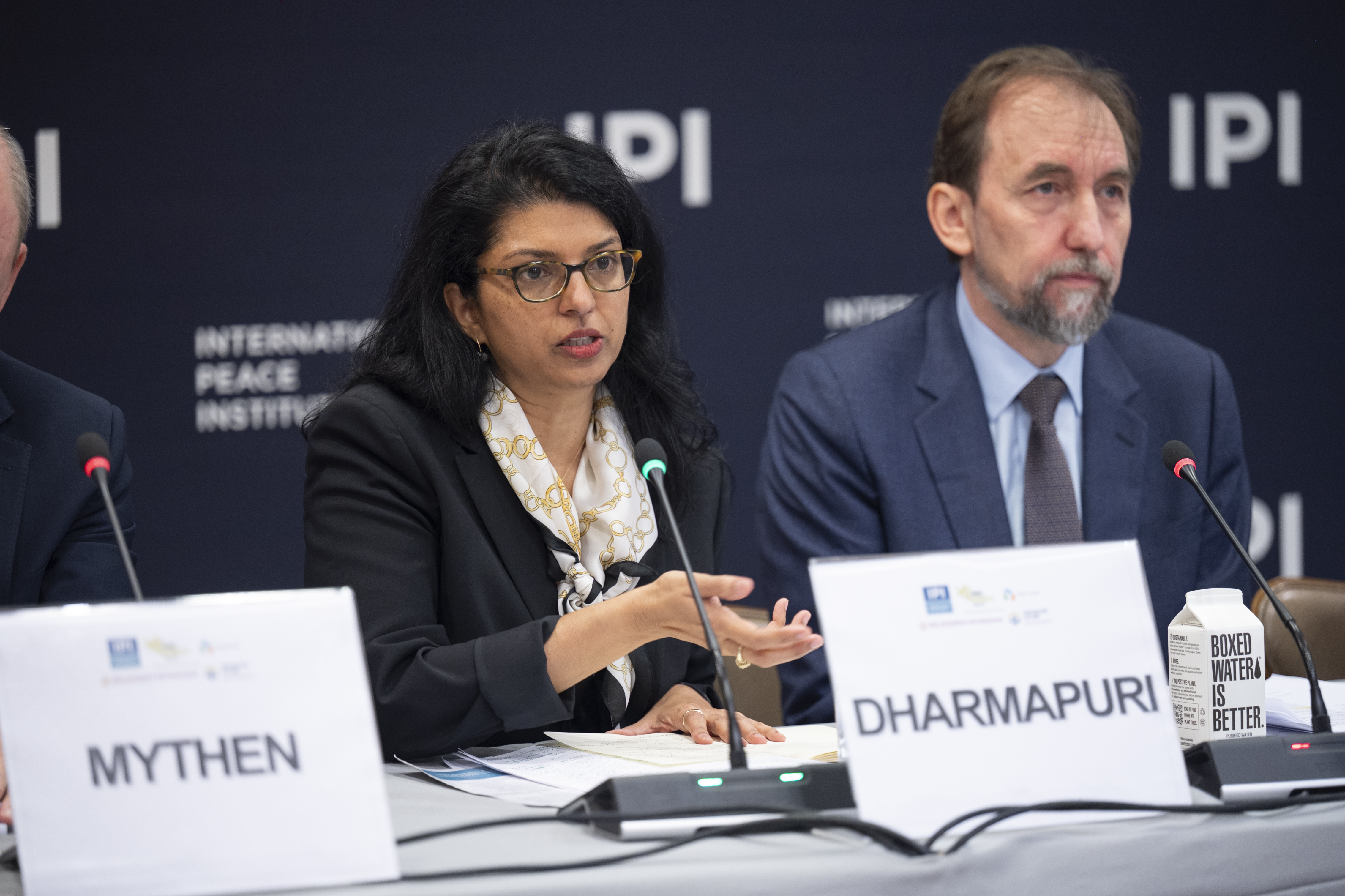
On September 24, 2025, the International Peace Institute (IPI) together with the Permanent Mission of Ireland to the United Nations, and the Secretary of Foreign Affairs of Mexico, in partnership with Our Secure Future (OSF) and the Nobel Women’s Initiative, cohosted the annual “Women, Peace, and Leadership Symposium on Women’s Leadership for International Peace and Security.”
The eighth annual Women, Peace, and Leadership Symposium took place on September 24, 2025 in New York City, as part of the side-events convened during the 80th session of the United Nations General Assembly (UNGA 80).
Key Themes
The symposium confronted the stark reality that after 25 years, the Women, Peace and Security (WPS) agenda faces unprecedented challenges. Speakers emphasized that this anniversary is “not a celebration” but a call to resistance against organized pushback on women’s equality. Three critical themes emerged: the need for political will over rhetoric; the strategic integration of technology; and the protection of the international order amid growing authoritarianism globally.
Speaker Highlights
H.R.H. Zeid Ra’ad Al Hussein (IPI President and CEO) who moderated the event, emphasized the need for identifiable movement leadership over its current diffuse cellular structure. Questioning who coordinates global WPS strategy, he emphasized that “if it’s everyone, it’s effectively no one.” Challenging the selective application of international law across conflicts, he also noted the tendency of some international leaders to avoid mentioning Gaza while speaking about women’s rights elsewhere.
H.E. Fergal Mythen (Permanent Representative of Ireland to the UN) reported that Ireland launched its fourth National Action Plan on September 15, 2025 as a whole-of-government approach. While acknowledging the current climate makes the WPS agenda “a harder sell,” he emphasized Ireland’s continued commitment amid global retreat, stating, “We’re not giving up. We’re not going back,” and concluded that “holding the line may be a good day’s work at the moment.”
Sahana Dharmapuri (Vice President, Our Secure Future and PAX sapiens Foundation) emphasized that women’s organizations possess irreplaceable WPS data and with it, meaningful leverage to shape the digital ecosystem on their own terms. She urged women’s movements not to remain reactive to platforms and policies, but instead to engage proactively - training, testing, and challenging AI systems through daily use, strategic data stewardship, and principled engagement that safeguards privacy and security. She underscored that WPS is a systems-change practice, and that focus should be on reconfiguring the rules of engagement rather than merely enduring them. At the same time, she cautioned against the privacy and security risks of sharing community-generated datasets, stressing the importance of finding responsible ways to contribute insights to AI models without endangering vulnerable populations.
Pablo Arocha (Legal Adviser, Mexican Ministry of Foreign Affairs) reported that Mexico is achieving a 1:1 gender ratio in its new Foreign Service class and called for men’s individual introspection, emphasizing that dismantling barriers “is an act of justice,” not kindness. He shared a success story of how masculinities became integrated into UN terrorism discussions after initial resistance and advocated for a UN resolution on multilateral feminist foreign policy.
Tawakkol Karman (2011 Nobel Peace Prize Laureate) declared that 75% of the world is now controlled by authoritarian regimes and called for protecting international institutions while pushing for reforms. She emphasized that “we individuals, we NGOs, we governments… shouldn’t give up,” and stressed the importance of building up new leaders and supporting youth as future change agents.
Sarah Hendriks (Director, Policy, Programme & Intergovernmental Division, UN Women) revealed that only 0.4% of official aid reaches women’s organizations compared to $2.7 trillion in global military spending, while female diplomatic representation remains stagnant at 21%. She outlined five key levers for change, including guaranteeing women’s direct participation as negotiators/mediators, resourcing women’s peace work, recognizing women’s full spectrum of peace leadership, protecting peacebuilders and human rights defenders, and investing in gender-responsive peace agreements, noting that only 31% of peace agreements last year included gender provisions.
Hiroyuki Saruhashi (Director, Gender Mainstreaming Division at Ministry of Foreign Affairs, Japan) reported that Japan elevated WPS as a main pillar of its foreign policy under former Foreign Minister Yoko Kamikawa. He also highlighted Japan’s unique National Action Plan that includes disaster risk reduction and response, and noted Japan’s co-chairmanship of the WPS Focal Points Network with Norway.
Delphine O (Ambassador-at-large and Secretary General for the Generation Equality Forum, French Ministry of Foreign Affairs) spoke about the fourth Ministerial Conference on Feminist Foreign Policy to be held in Paris in October and stressed the importance of integrating WPS into feminist foreign policy rather than maintaining a siloed approach. She highlighted several actionable steps, including reviewing policy gaps, setting forward-looking commitments, and elevating new priorities including climate–security linkages and the digital/AI domain - both to mitigate tech-enabled targeting of women peacebuilders and to better harness technology for women’s organizations.
Arlene Tickner (Ambassador-at-Large for Gender Issues and Global Feminist Policy, Colombia) called for “being loud, provoking discomfort” rather than quiet diplomacy in the current adverse environment. She described Colombia’s development of a peace-security-care nexus, linking peace and security with care systems and social protections, as a strategic entry point. The framework argues that centering care - who provides it, how it is resourced, and its community impacts - can reduce violence, support prevention, and build social cohesion, making peace more sustainable. She also announced plans for a WPS observatory for Latin America and the Caribbean, which will be a structured monitoring and knowledge hub to collect, analyze, and publish data, trends, and practices related to WPS in the region.
Kaavya Asoka (Executive Director, NGO Working Group on WPS) issued three urgent calls: upholding international law consistently, defending women’s rights despite difficulty, and supporting civil society movements. She highlighted the dire conditions in Gaza, where “one woman and one girl on average are being killed every hour” and declared that “power concedes nothing without a demand. Civil society stands ready to make those demands.”
Calls to Action and Closing
Speakers issued urgent calls for coordinated action requiring member states to
- move beyond rhetoric to implementation,
- consistently apply international law across conflicts, and
- increase funding for women’s organizations.
Afghan women activists in attendance challenged the international community’s four years of ineffective engagement with the Taliban, demanding action beyond statements of condemnation. In response, it was underscored that proper political processes must be established for contexts like Afghanistan, where women face gender apartheid. Support also emerged for the appointment of the first woman UN Secretary-General after 80 years, with France’s October Feminist Foreign Policy Conference identified as a key coordination opportunity. Participants emphasized the “duty to hope” while acknowledging this moment requires unprecedented coordination and courage to preserve both the WPS agenda and the international order itself. Watch a recording of the event here.

Top photo: Panelists at the eighth annual Women, Peace and Leadership Symposium at the International Peace Institute on September 24, 2025. Photo credit: International Peace Institute
Bottom photo: OSF Vice President Sahana Dharmapuri speaking at the Women, Peace and Leadership Symposium. Photo credit: International Peace Institute